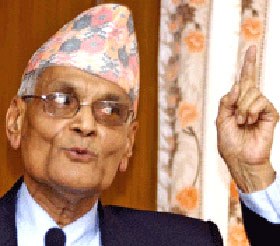 Tulsi Giri, vice-chairman of the council of ministers, has once again stirred Nepal’s political waters. This time, King Gyanendra’s principal deputy has mounted a frontal assault on the conventional wisdom that the kingdom’s political stalemate could be solved if the monarch and the mainstream parties reconcile.
Tulsi Giri, vice-chairman of the council of ministers, has once again stirred Nepal’s political waters. This time, King Gyanendra’s principal deputy has mounted a frontal assault on the conventional wisdom that the kingdom’s political stalemate could be solved if the monarch and the mainstream parties reconcile.In Dr. Giri’s opinion, such a conclusion is not only erroneous; it is dangerously wrongheaded. Terrorism and the political crisis, he told a Kathmandu audience the other day, are different things that should be dealt with separately. The remark touched off a new spiral of criticism, which Dr. Giri is accustomed to. It takes great political conviction, after all, to embark on a controversial enterprise accepting a demotion. (Dr. Giri had served as chairman of the council of ministers way back during King Mahendra’s reign.)
The vice-chairman’s latest remark came in handy for former premier Surya Bahadur Thapa, chief of the one-year-old Rastriya Janashakti Party (RJP). Thapa must have been laboring to come up with something to say at the anniversary function. Frankly, the only achievement of the RJP has been to prevent deputy chief Prakash Chandra Lohani from leaving the organization. Thapa got to devote the anniversary function to excoriating Dr. Giri.
Critics of the royal regime must have been doubly infuriated by the forum Dr. Giri used to convey his thoughts: the Federation of National Journalists, which was formed by scribes supporting the royal takeover.
Before dismissing Dr. Giri’s assertion as another manifestation of senility, however, consider the substance of his argument. “The problem of terrorism existed even during the 1996-2005 period when the King and the political parties were together,” he said. Of course, members of the Seven-Party Alliance (SPA) don’t want to hear that when they are joining hands with very group of people they had designated terrorists.
Dr. Giri’s remarks came a day after Donald Camp, US Principal Deputy Assistant Secretary of State for South Asia, urged King Gyanendra to reach out to political parties and restore multiparty democracy. Indeed, the vice-chairman wasn’t too impressed with what Camp had to say. President Bush didn’t need to dispatch an emissary to repeat a slight variation of the 25-word mantra he had uttered in New Delhi.
Our vice-chairman may have rebuffed the first part of Camp’s plea. He has long been eager to implement what happened to be Camp’s second. Dr. Giri stated that the royal government was firm on holding parliamentary elections. Of course, Camp has already delegitimized any election conducted without the SPA’s participation.
Dr. Giri enunciated another imperative. Only parliament has the right to interpret the controversial Article 127 of the Constitution, on which King Gyanendra has based his political assertiveness since October 4, 2002.
Now, the right honorable justices of the Supreme Court must be seething at Dr. Giri encroachment on judicial jurisdiction. Maybe this could goad them into emphasizing the urgency of enshrining a Constitutional Court in a new/amended constitution to rule on such politically charged matters.
With King Gyanendra taking turns meeting with royalist politicians and heads of the security agencies, an official schedule of the parliamentary elections may be expected any day.
Another election with a 20 percent turnout? You bet. At least that legislature would be livelier than the one the SPA wants to bring back on life support.